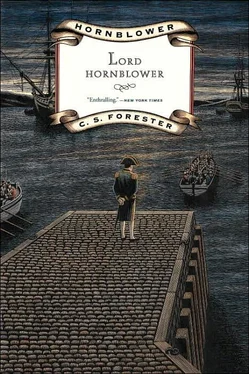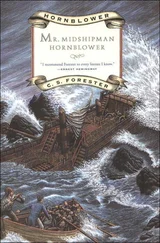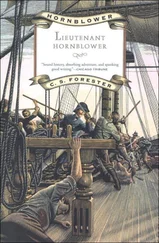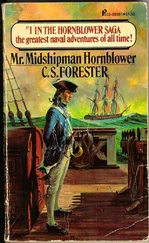Cecil Forester - Lord Hornblower
Здесь есть возможность читать онлайн «Cecil Forester - Lord Hornblower» весь текст электронной книги совершенно бесплатно (целиком полную версию без сокращений). В некоторых случаях можно слушать аудио, скачать через торрент в формате fb2 и присутствует краткое содержание. Год выпуска: 1989, ISBN: 1989, Издательство: Little, Brown & Company, Жанр: Исторические приключения, Путешествия и география, Морские приключения, на английском языке. Описание произведения, (предисловие) а так же отзывы посетителей доступны на портале библиотеки ЛибКат.
- Название:Lord Hornblower
- Автор:
- Издательство:Little, Brown & Company
- Жанр:
- Год:1989
- ISBN:0316289434
- Рейтинг книги:5 / 5. Голосов: 1
-
Избранное:Добавить в избранное
- Отзывы:
-
Ваша оценка:
- 100
- 1
- 2
- 3
- 4
- 5
Lord Hornblower: краткое содержание, описание и аннотация
Предлагаем к чтению аннотацию, описание, краткое содержание или предисловие (зависит от того, что написал сам автор книги «Lord Hornblower»). Если вы не нашли необходимую информацию о книге — напишите в комментариях, мы постараемся отыскать её.
Lord Hornblower — читать онлайн бесплатно полную книгу (весь текст) целиком
Ниже представлен текст книги, разбитый по страницам. Система сохранения места последней прочитанной страницы, позволяет с удобством читать онлайн бесплатно книгу «Lord Hornblower», без необходимости каждый раз заново искать на чём Вы остановились. Поставьте закладку, и сможете в любой момент перейти на страницу, на которой закончили чтение.
Интервал:
Закладка:
“Hers is perfect,” said Hornblower—it seemed the best thing to do to agree.
“Why has she not married again?” wondered Barbara. “She must have been married very young, and she has been a widow for some years, you say?”
“Since Aspern,” he explained. “In 1809. One son was killed at Austerlitz, one died in Spain, and her husband, Marcel, at Aspern.”
“Nearly six years ago” said Barbara.
Hornblower tried to explain; how Marie was not of blue blood herself, how whatever fortune she had would certainly revert to the Graçays on her remarriage, how their retired life gave her small chance of meeting possible husbands.
“They will be moving much in good society now,” commented Barbara, thoughtfully. And some time afterwards, à propos of nothing, she added, “Her mouth is too wide.”
Later that night, with Barbara breathing quietly beside him, Hornblower thought over what Barbara had said. He did not like to think about Marie’s remarriage, which was perfectly ridiculous of him. He would almost never see her again. He might call once, before he returned to England, but that would be all. Soon he would be back in Smallbridge, in his own house, with Richard, and with English servants to wait on him. Life in future might be dull and safe, but it would be happy. Barbara would not be in Vienna for always. With his wife and his son he would lead a sane, orderly, and useful life. That was a good resolution on which to close his eyes and compose himself to sleep.
Chapter XVII
Two months later saw Hornblower sitting in a chaise driving along through France towards Nevers and the Château of Graçay. The Congress of Vienna was still sitting, or dancing—someone had just made the remark that the Congress danced but made no progress—and Barbara was still entertaining. Little Richard spent his mornings in the schoolroom now, and there was nothing for an active man to do in Smallbridge except feel lonely. Temptation had crept up on him like an assassin. Six weeks of mooning round the house had been enough for him; six weeks of an English winter of rain and cloud, six weeks of being hovered over by butler and housekeeper and governess, six weeks of desultory riding through the lanes and of enduring the company of his bucolic neighbours. As a captain he had been a lonely man and yet a busy one, a very different thing from being a lonely man with nothing to do. Even going round to parties in Paris had been better than this.
He had caught himself talking to Brown, harking back to old experiences, reminiscing, and that would never do. He had his dignity still to consider; no strong man could be weak enough to yearn for activity and interest. And Brown had talked eagerly about France, about the Château of Graçay, about their escape down the Loire—maybe it was Brown’s fault that Hornblower’s thoughts had turned more and more towards Graçay. As a fugitive he had found a welcome there, a home, friendship, and love. He thought about the Count—it may have been because his conscience troubled him, but undoubtedly at first it was the Count that he thought about rather than Marie—with his courtesy and kindliness and general lovableness. With Bush dead it was likely that the Count was the man of whom Hornblower was fondest in all the world. The spiritual tie of which Hornblower had been conscious years ago was still in existence. Under the surface of his thoughts there may have been a tumultuous undercurrent of thoughts about Marie, but it was not apparent to him. All he knew was that one morning the pressure of his restlessness had become overwhelming. He fingered in his pocket the Count’s pleasant letter, received some days ago, telling him of his and his daughter-in-law’s return to Graçay and repeating his invitation to come and stay. Then he had shouted to Brown to pack clothes for both of them and to have horses put to the chaise.
Two nights ago they had slept at the Sign of the Siren in Montargis; last night at the post-house at Briare. Now here they were driving along a lonely road overlooking the Loire, which ran like a grey ocean at their right hand, wide and desolate, with forlorn willows keeping a desperate foothold waist deep in the flood. Lashing rain beat down upon the leather tilt of the chaise, thundering down upon the taut material with a noise that made conversation difficult. Hornblower had Brown beside him in the chaise; the unfortunate postilion, hat drawn down over his ears to meet the collar of his cape, riding the near-side horse in front of them. Brown sat with folded arms, the model gentleman’s servant, ready to converse politely if Hornblower showed any inclination to do so, keeping a discreet silence until addressed. He had managed every detail of the journey remarkably well—not that it would be difficult to manage any journey in France for an English milord. Every post-house keeper, however insolent in his office, was reduced to instant deference at the mention of Hornblower’s rank.
Hornblower felt Brown stiffen beside him, and then peer forward through the driving rain.
“The Bec d’Allier,” said Brown, without being spoken to first.
Hornblower could see where the grey Allier joined the grey Loire at an acute angle—all this country was under moderate floods. There was something a little odd about having a coxswain who spoke French with the facility and good accent of Brown, who must have made (of course Hornblower knew he had) the best use of his months of living below stairs at Graçay when they had been escaped prisoners of war together—they and Bush. Hornblower could feel a mounting excitement in Brown, comparable with his own, and that was hard to explain in Brown’s case. There was no reason for Brown to feel the same sort of homesickness for Graçay that Hornblower felt.
“Do you remember coming down here?” asked Hornblower.
“Aye, my lord, that I do,” said Brown.
It was down the Loire that they had made their historic escape from France, a long, curiously happy voyage to Nantes, to England, and to fame. Graçay could only be a few miles ahead now; Brown was leaning forward expectantly in the chaise. There it was, the grey pepper-pot turrets only just visible in the distance against the grey sky through the rain. A flag flying from the flagstaff made a tiny darker spot above the château. The Count was there. Marie was there. The postilion shook up his depressed horses into a smarter trot, and the château came nearer and nearer; the unbelievable moment was at hand. All the way from Smallbridge, from the time when Hornblower had decided to start, it had seemed as if it was quite impossible that they were going to Graçay. Hornblower had seemed to himself like a child crying for the moon, for their goal was so desirable as to seem necessarily unattainable. Yet here they were, reining up at the gates, and here the gates were opening and they were trotting forward into the so-well-remembered courtyard. Here was old Felix the butler hurrying out into the rain to welcome them, and over there by the kitchens stood a group of serving-women, fat Jeanne the cook among them. And here, beside the chaise, at the head of the far stone steps sheltered from the rain by the projecting roof overhead, were the Count and Marie. It was a homecoming.
Hornblower scrambled down awkwardly from the chaise. He stooped to kiss Marie’s hand; he went into the Count’s arms and laid cheek to cheek to the manner born. The Count was patting his shoulder.
“Welcome. Welcome.”
There was no pleasure on earth comparable with this sensation of being looked for and of feeling that his arrival was causing pleasure. Here was the well-remembered drawing-room with the old gilt Louis-Seize chairs. The Count’s wrinkled old face was mobile with delight, and Marie was smiling. This man had broken her heart once, and she was ready to let him break it all over again—she knew he would—because she loved him. All Hornblower was conscious of was her smile, welcoming and—and—was it maternal? There was a proud sadness in that smile, like that perhaps of a mother watching her son grown up now and soon to be lost to her. It was only a fleeting feeling that Hornblower had; his powers of observation were negatived immediately by his own wave of personal feeling. He wanted to take Marie to him, to feel her rich flesh in the circle of his arms, to forget his troubles and doubts and disillusionments in the intoxication of her embrace; just as four years ago he had found oblivion there, selfishly.
Читать дальшеИнтервал:
Закладка:
Похожие книги на «Lord Hornblower»
Представляем Вашему вниманию похожие книги на «Lord Hornblower» списком для выбора. Мы отобрали схожую по названию и смыслу литературу в надежде предоставить читателям больше вариантов отыскать новые, интересные, ещё непрочитанные произведения.
Обсуждение, отзывы о книге «Lord Hornblower» и просто собственные мнения читателей. Оставьте ваши комментарии, напишите, что Вы думаете о произведении, его смысле или главных героях. Укажите что конкретно понравилось, а что нет, и почему Вы так считаете.









